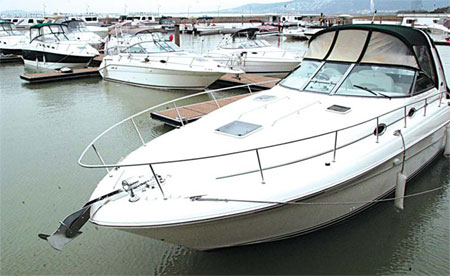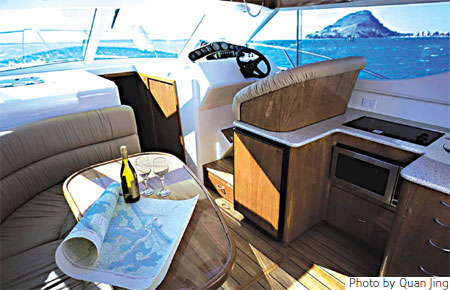| ?

|
|
Most Chinese knew nothing about yachts 20 years ago, but now a growing band are taking up sailing. |

It's a sunny Sunday morning and Jeff Wang is setting out for a morning's sailing with his four mates.
He said he bought his yacht on an impulse six years ago, while visiting the US Mercury Yacht Club at Taihu Lake in Suzhou. At that time he had no idea how to sail.
His vessel of choice was a Sea Ray sport cruiser. It set him back nearly 1 million yuan ($146,400) but it has changed his life.
Every weekend since, weather permitting, Wang either takes along his family or close friends and the time flies by with music, wine, laughter and perhaps the odd anecdote about a recent victory at work.
"Life is a journey and you can only experience the real sense of the journey after you have boating as part of your life," Wang enthuses.
This Shanghai businessman is one of a growing band of Chinese to take up sailing and buy a yacht. Worries about the worldwide recession seem to have passed them by as they shell out their hard-earned cash from between 500,000 ($73,500) to 60 million ($8.8 million) yuan.
Charles Zhang, founder and chairman of China's leading Web portal, Sohu.com, is reported to have purchased a 22-m Sunseeker boat, costing 63.4 million yuan, and many businessmen in Zhejiang and Jiangsu provinces are buying entry-level vessels to go sailing.
Yang Xinfa, chairman of the China Boating Industry and Trade Association, says yachting's profile in China is being raised amid such major events as the Beijing Olympics and Shanghai Expo 2010.
In pre-recession 2007, the number of millionaires in China soared 20.3 percent to 415,000, putting it second in the Asia-Pacific region after Japan.
It is estimated that the number of Chinese millionaires could leap another 50 percent - to 620,000 - within two to three years. China is also the world's third largest consumer of luxury goods behind the US and Japan, with American investment giant Goldman Sachs predicting China will top the table by 2015.
"Hosting the Olympics has propelled the country's economic and social development," Yang said during the recent World Ocean Week in Xiamen.
The Qingdao Olympic Sailing Center has become a yachting club with 800 berths, a five-star hotel and a dock for international passenger liners. Yachting is expected to catch on with the Chinese even faster in future with new regulations on yacht safety management and testing taking effect on Jan 1, 2009, Yang added.
Yadvinder Rana, regional sales manager for Azimut Yachts, reckons the sport's potential in China is huge. "Western brands enjoy healthy profit margins in China, even more than in Europe and North America," he says. "There is no reason China cannot be as big a market as other countries."
Ten years ago China did not have a single yacht club. It now has 58, with the largest one having more than 600 berths. More than 50 marinas are under construction around the country and Expo 2010 Shanghai will support both the development of the industry's infrastructure and the construction of five marinas to be finished by 2010.
In addition, 58 cities in 17 provinces are looking at building clubs and marinas, and more than a dozen cities hold annual exhibitions, spreading the gospel and encouraging enthusiasts to take part.
Xiamen in Fujian province has become the second East China city to establish a yachting industry after Qingdao in Shandong province.
Xie Qidong, of the Hansheng Yacht Building company in Xiamen, says the company has cranked up its marketing over the last year and is seeing more domestic customers than ever before
Most Chinese knew nothing about yachts 20 years ago but boats made in China are today berthed at private docks in the US, France, Italy and Australia. The country last year exported 1 million boats worth $180 million. Some of these fetched eye-watering prices - the Shanghai Double Happiness Yacht company once sold a 28 m vessel for 190 million yuan.
Xie says one reason is the improvement in the quality of Chinese-made boats. Another is their price. "They are usually 40 to 50 percent cheaper than their international counterparts who manufacture in developed countries," he adds.
Not that yachting is the exclusive domain of the rich, however. "It can develop into a sport for all middle-class Chinese," Yang says. "An entry-level yacht is as cheap as an automobile."
Nor do you have to buy a yacht - joining a club is a popular way to gain affordable access to the water.
The Longcheer Yacht Club in Shenzhen charges an annual membership fee of 130,000 yuan and members can then rent yachts and boats on an hourly basis. Boat owners pay at least 390,000 yuan but this includes the rental on a berth.
The club now has 500 members, including 60 premier members, mostly IT professionals aged 30-45.
"Owning a yacht can dramatically change your life," says Longcheer general manager Zhang Yong.
He compares the development of yachting in China to that of golf.
"The Chinese were unfamiliar with golf a decade ago and it was considered a luxurious sport for the super rich. But it (golf) has become very popular today," he says.
However, experts say besides being expensive the further development of yachting also needs favorable policies and infrastructure support.
For instance, such policies in the areas of finance and insurance, the opening of water areas and navigation routes, establishment of rescue and environment protection systems, driving license training, are still under research and being finalized.
China has a coastline of 18,000 km, offering plenty of opportunities for watersports.
"China is one of the best countries for the development of yachting but we almost have to start from scratch, compared with western countries," Yang said.
In the US, for example, the world's largest yacht market, there are 18 million vessels, compared with its population of just 300 million.
(China Daily December 17, 2008)